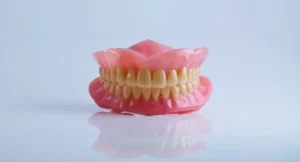Temporary dentures offer a practical solution for individuals awaiting permanent prosthetics or healing from dental procedures. These removable dental appliances serve as a substitute for missing teeth, enhancing aesthetic appearance and functionality. They are typically made from lighter materials and designed to be worn for a short duration. This article explores how temporary dentures work, the benefits they provide during the transitional period, and what patients can expect when using them.
Benefits of Temporary Dentures
Temporary dentures, also known as interim dentures, provide an array of advantages that can significantly improve a patient’s quality of life while awaiting permanent dental solutions. These prosthetic devices are designed to offer immediate relief and functionality, making the transitional period smoother and more comfortable. This section delves into the specific benefits that temporary dentures offer, focusing on two main aspects: immediate results and comfort and function.
Understanding the benefits of temporary dentures is crucial for both patients and dental professionals to make informed decisions during the treatment planning process. By exploring the immediate and long-term advantages, we can highlight why temporary dentures are a viable interim solution before the placement of permanent prosthetics.
Immediate Results
One of the most significant benefits of temporary dentures is the ability to achieve immediate results. Following tooth extraction or dental surgery, the absence of teeth can be both aesthetically and functionally challenging. Temporary dentures can be placed immediately after the procedure, allowing patients to regain their smile and chewing function without delay. This immediate solution helps to maintain a sense of normalcy and confidence during the healing period.
The immediate placement of temporary dentures also aids in the healing process. By providing coverage to the extraction sites, these dentures can protect the gum tissue and reduce the risk of post-operative complications such as dry socket. Additionally, having temporary dentures in place can help to maintain the proper spacing and alignment of teeth, preventing neighboring teeth from shifting into the gaps left by the extracted teeth.
Moreover, temporary dentures play a vital role in the psychological well-being of patients. The sudden loss of teeth can be emotionally distressing, affecting one’s self-esteem and social interactions. The ability to have a functional and aesthetic temporary solution can greatly alleviate these psychological impacts, allowing patients to continue their daily lives with minimal disruption.
Comfort and Function
Another key advantage of temporary dentures is the improvement in comfort and function they provide. Designed to fit snugly over the gums, these dentures help maintain the natural contours of the mouth, providing a more comfortable experience compared to the alternative of having no teeth. Patients can continue to eat, speak, and smile with confidence, knowing that their temporary dentures are offering both support and functionality.
Temporary dentures are typically fabricated from materials that prioritize patient comfort. They are designed to be lightweight and flexible, minimizing any potential irritation to the gum tissue. This focus on comfort ensures that patients can wear their temporary dentures for extended periods without experiencing significant discomfort or soreness.
In addition to comfort, temporary dentures enhance the overall function of the oral cavity. By providing a set of functional teeth, these dentures enable patients to chew and digest food more effectively. Proper mastication is crucial for overall health and nutrition, and temporary dentures ensure that patients can maintain a balanced diet during the transition to permanent dental solutions.
Furthermore, temporary dentures can be easily adjusted or relined by the dentist to ensure an optimal fit as the healing process progresses. This adaptability makes temporary dentures a practical choice for managing the dynamic changes that occur in the mouth following dental procedures. The ability to make adjustments ensures that the dentures remain comfortable and functional throughout the healing period. In conclusion, temporary dentures are an indispensable tool in modern dentistry, offering immediate results and enhancing comfort and function for patients undergoing dental procedures. Understanding these benefits can help patients and professionals navigate the transitional period with greater ease and confidence. For more in-depth information on related topics, be sure to explore our other articles.
When to Consider Temporary Dentures
Temporary dentures, also known as interim dentures or provisional prosthetics, serve as placeholders while waiting for the permanent restoration. They are usually recommended in specific scenarios to ensure both functionality and aesthetics during the healing period. One of the main reasons to consider temporary dentures is when you are undergoing a dental procedure that involves significant time spans between different stages. For instance, after tooth extraction, the gums and bone require a healing period before an implant can be placed and restored. Temporary dentures provide an ideal solution during this interim period, allowing patients to maintain their normal lifestyle and appearance.
Another situation where temporary dentures are beneficial is when multiple teeth are being extracted or repaired. In such cases, having temporary dentures ensures that the patient’s ability to chew, speak, and smile is not compromised. This is particularly important for maintaining oral health and quality of life during the treatment process. Additionally, temporary dentures can help in shaping the gum tissues, which is crucial for achieving the best possible fit and aesthetics with the final prosthetic. The temporary dentures will guide the soft tissues and help in determining the optimal placement and alignment of the permanent restoration. Moreover, temporary dentures are often recommended when there is a need for extensive dental work that spans several months. This may involve procedures like bone grafting or other forms of regenerative treatments that require a considerable amount of healing time. By providing a functional and aesthetic solution during this period, temporary dentures ensure that the patient does not experience discomfort or inconvenience. They also serve as a test run for the final restoration, allowing both the dentist and the patient to make any necessary adjustments before the permanent dentures are fabricated and placed.
Caring for Your Temporary Dentures
Temporary dentures are an essential tool for many patients during the transition phase of their dental restoration journey. Proper care and maintenance of these temporary prosthetics are crucial to ensure comfort and longevity. Here, we will outline the best practices for looking after your temporary dentures effectively.
It’s important to note that temporary dentures are designed to be a short-term solution. Thus, they might require more diligent care than permanent prosthetics to prevent any damage or discomfort. Following a routine for cleaning, handling, and professional check-ups will help in maintaining them in the best possible condition.
Cleaning Routine
Maintaining a clean oral environment is vital when wearing temporary dentures. Here’s a simple yet effective cleaning routine you should follow:
- Rinse your dentures with warm water after each meal to remove any food particles.
- Use a soft-bristled toothbrush to clean all surfaces of the dentures daily. Avoid using regular toothpaste, which can be abrasive.
- Soak your dentures overnight in a denture-specific cleaning solution. This helps eliminate bacteria and keeps the dentures fresh.
By adhering to this cleaning routine, you can minimize the risk of gum irritation and the buildup of plaque on your dentures, ensuring a more comfortable experience.
Handling and Storage
Proper handling and storage of temporary dentures is crucial to avoid damage. Here are some tips to consider:
- Avoid bending or twisting your dentures, as this can compromise their fit and function.
- When not in use, always store your dentures in a protective case filled with water or denture solution to prevent them from drying out.
- Handle your dentures over a soft surface, like a towel, to lessen the chance of breakage if you accidentally drop them.
Neglecting these basic handling and storage precautions can lead to unnecessary wear and tear on your temporary dentures, impacting their performance and comfort.
Professional Check-ups
Regular professional check-ups with your dentist are imperative while using temporary dentures. These check-ups allow your dental professional to:
- Monitor the fit and comfort of your dentures, making adjustments as necessary.
- Ensure there are no signs of oral health issues, such as gum disease, that could be exacerbated by ill-fitting dentures.
- Provide professional cleaning to remove any stubborn deposits that at-home care might miss.
Professional check-ups are not just about maintaining the condition of the dentures but also about ensuring your overall oral health is in top shape during your transition to permanent dental solutions.
Caring for your temporary dentures properly is crucial for a comfortable transition to your final restorations. Be sure to read our other articles for more tips and insights on dental care and maintenance.
Common Questions About Temporary Dentures
If you’re considering temporary dentures as part of your dental restoration journey, it’s important to understand their role and how they fit into the broader context of dental implants and bone regeneration procedures. Here are answers to some commonly asked questions that might assist in making informed decisions.
How are temporary dentures used in the process of dental implants?
Temporary dentures serve a critical role in the dental implant process, particularly when waiting for the permanent restorations. After implants are placed, a healing period is necessary for osseointegration to occur, during which the bone securely attaches to the implant. During this phase, temporary dentures can be used to provide aesthetic and functional benefits, allowing patients to maintain their everyday activities without discomfort or significant dietary restrictions.
What are the advantages of using temporary dentures over other types of temporary teeth replacements?
Temporary dentures offer several advantages compared to other forms of temporary teeth replacements. They are generally more affordable, quicker to fabricate, and easier to adjust, which makes them an excellent choice for many patients during the interim period before permanent prosthetics are installed. Additionally, temporary dentures help preserve the alignment of the surrounding teeth and maintain the integrity of the facial structure, preventing the issues associated with prolonged tooth loss.

My name is Salman Kapa, a 73-year-old expert in bone regeneration and dental implantology. With decades of experience in the field, I am dedicated to advancing our understanding of oral health and hygiene. Through my research and writing, I aim to contribute to the development of innovative solutions in dental care.




